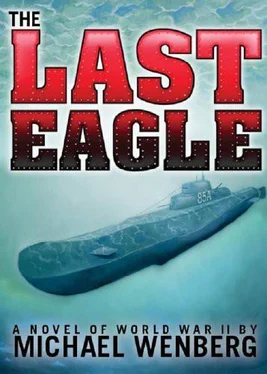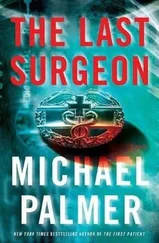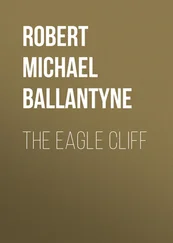Though aspects of Ritter’s plan had changed over the months, its main objective had always remained the same: Ritter and his men were going to take the Eagle from the Poles—steal her. And if they couldn’t have her, no one would.
Ritter had vowed to himself that it wouldn’t come to that.
Breathing easily through his nose, he scrambled up a steep embankment. All his years at sea had failed to completely disguise the sure steps of an experienced woodsman.
The evening air was sharp with the smell of decaying leaves and burning coal from the nearby town. The scent reminded him of the small Prussian village his family had called home for nearly over five hundred years.
He wondered what would become of it. It had survived countless invaders: Swede. French. German. Russian. The walls of the family castle were dominated with the brooding portraits of his ancestors—warriors all—while the outside still bore the scars of time and weather, cannon balls and bullets.
And now it was his turn. A new war was about to begin. Or, as his crippled father, the ex–general, would snort with derision, his voice thickened with brandy and regret: “It won’t be new. Just a continuation of the Kaiser’s last bollix.”
Ritter glanced at his Rolex. A few more hours.
The telegram awaiting him in his room earlier had been innocuous enough: “Baby and I are fine. Hope you are having a good time. We miss you. Love, Greta.” Once decoded, it relayed the message he had been waiting for. Tomorrow, the war and his part in it, would begin.
He quickened his pace, feeling the steady thump in his chest, his legs burning. Though he looked younger, he was approaching thirty-five. His close-cropped blond hair was already beginning to whiten at the temples. No longer a young man. And yet, he refused to slow down, refused to yield to weakness and age.
Of course, he was not senior enough to be privy to the overall German plans, just his small, unimportant piece of the conflict. But that had been augmented with occasional comments and knowing laughter from friends in places and positions to know.
He didn’t need their help or the skills of a fortune-teller to imagine how it would begin. A trumped-up provocation on the frontier. Some poor son-of-a-bitch of a Polish commander, his troops suddenly under fire, wondering why hell itself has been revealed, trying to raise his superiors, lamely explaining that he had done nothing to provoke the massive German response. And then the wire would go dead, the commander and his men soon to follow.
That lucky fool corporal. Over the years, Ritter had watched with amazement as no one had called his bluff. Oh, they had blustered and barked, like poodles in the arms of their masters. He had continued to take, and take again. The German High Command, waiting for a response, an excuse to get rid of him and step into power, and yet hoping beyond hope that he would not be stopped. Who could have imagined that none would strike back? And now he was untouchable, and they were stuck with him whatever the end might bring.
Ritter slipped on a patch of exposed clay, his knee striking hard against a rock. He gasped from the pain, but pulled himself up and continued on, barely limping though his leg was numb. In some strange way, he was glad for the pain and what it told him. He was alive.
That wise old bulldog, Churchill, Ritter thought, knew what was to come. And yet, he had been discarded by the English like an old can of peas.
What had Dönitz said? Churchill was off painting landscapes? How British of him. He probably wrote poetry, as well, and ate dainty little cakes while sipping tea with his pinky raised like a surrender flag in the air. Members of the British aristocracy were not known for their masculine vigor. What little they had came from mating with vigorous German royalty the previous century.
Despite his infatuation with watercolors, Churchill was not so distracted that he hadn’t warned of the coming whirlwind or recognized the primal roar of the German people in the background of Hitler’s speeches for what it was. But no one had listened to him. He was alone. The English preferred the soothing words of Chamberlain.
The French were even more foolish. It was understandable. They had left 1.5 million of their best men on the shattered battlefields of France twenty years earlier. The idea of another war was too soon, nightmares and memories still too fresh in so many minds. Ritter was confident that when confronted by the combined might of the German Wehrmacht , Luftwaffe and Kriegsmarine , their resolve would vanish like smoke before a Teutonic gale.
As the trail crested a final rise, Ritter began to jog, the pain in his knee finally subsiding. He hurried along the trail as it headed toward his destination, anxious now to get to the prow of land that gave a panoramic view of the city and the harbor.
He stepped out onto a huge rock discarded by a receding glacier 12,000 years earlier, and looked out. Below him, the lights of Gdynia twinkled in the dusk. A dozen ships hung on their anchors in the harbor. Assorted freighters and fishing boats, mostly. The Baltic beyond lay black and quiet and smooth, a mist already beginning to erase the horizon. Closer in, however, huddled next to the quay, was a Polish submarine.
He had wanted one last look, remembering the De Schelde shipyards and the first time he had gazed at the Eagle , remembering how it felt.
Early tomorrow, hundreds of kilometers to the west, the dying would begin, but if luck held, he and his men would soon be in possession of what he and Admiral Dönitz desired most.
After he seized command, his first order as her new captain would be to replace the Polish flag flying above her bridge with one bearing the German swastika. Eagle , however, she would remain.
“It’s not fair,” Sublieutenant Eryk Pertek of the Polish Navy’s submarine Eagle said pointedly, slapping the scarred tabletop for emphasis.
His boss, Lieutenant Commander Stefan Petrofski, scratched the side of his beard and shrugged in the direction of his navigator and friend. As second in command of the Eagle , he knew he shouldn’t have another beer. In addition to Pertek, there were a dozen other members of the Eagle’s crew scattered throughout the pub. Part of Stefan’s job as a Polish naval officer was to be a good example to his men. And that meant staying reasonably sober when he was out in public. Tonight, he didn’t care. He drained his mug, and then roared “Beer!” in a voice that demanded obedience.
His shout was like a slap on the bottom of the plump waitress behind the bar. She filled another mug to overflowing and began waddling in their direction, not bothering to stop and apologize to the customers she wet with spilled beer along the way.
Stefan admired the way she wove between the tables like a skilled soccer player on the attack, avoiding slaps and pinches, twisting away from grabs and caresses, using a combination of bluster and sweetness to get her message across: look, but don’t touch. There was enough to enjoy, particularly in the bounce of her ample breasts.
A few years earlier he might have made a try for her. Flirting was a holy obligation of every sailor. If he put his mind to it, he might have succeeded in convincing her that he was more than a worn-out sailor. He knew from experience that a smile transformed his bearded, sea-weathered face into something that some women found appealing or, at least, sympathetic. But tonight was not the night. So instead, he said “Tthank you” when she slammed his beer on the table, pushing a bill in her direction that more than covered the price of a dozen.
“Too much,” she protested, glaring at him with suspicion, brushing aside a dark wet strand plastered to her forehead.
Читать дальше












